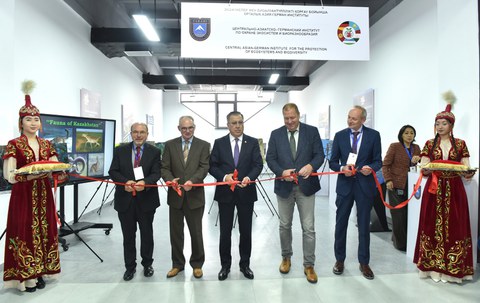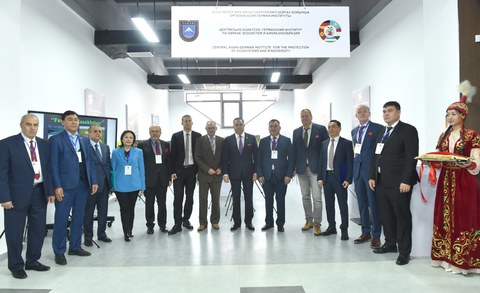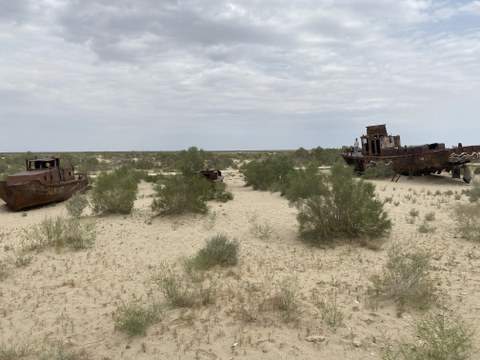Nov 13, 2025
New virtual research center in Central Asia for the protection of ecosystems and biodiversity with TUD participation

Inauguration of CAGEB: Karl-Heinz Feger, TUD; Matthias Kramer, NETSCI; Zhanseit Tuimebayev, Al-Farabi National University; Hendryk Flachowski, JKI Institute Pillnitz; Ulrich Pietzarka, Forest Botanical Garden and Saxon State Arboretum Tharandt
The "Central Asian-German Institute for the Protection of Ecosystems and Biodiversity - CAGEB" has been established at the Kazakh National University Al-Farabi in Almaty. Senior Professor Karl-Heinz Feger (Faculty of Environmental Sciences) and Dr. Ulrich Pietzarka, Curator of the Forest Park Tharandt, two representatives of TU Dresden were also involved in the opening ceremony on November 6. The establishment of the virtual center was preceded by several preparatory meetings, most recently in May in Dushambe (Tajikistan) and Nukus (Uzbekistan) - also with TUD participation. CAGEB was initiated by the emeritus environmental economist Prof. Matthias Kramer, formerly of the International Institute (IHI) Zittau at TU Dresden and former Rector of the German-Kazakh University of Almaty. He also acts as coordinator within the framework of NETSCI (NETwork for System Competence and Innovation). The basic activities were funded by the Federal Ministry of Research, Technology and Space (BMFTR) and the German Federal Environmental Foundation (DBU).

Scientific and political representatives from several Central Asian countries and Germany were present.
The new center, which is based at the renowned Al-Farabi University in Almaty, initially serves the exchange of experience and cross-border networking. However, the main objective is to further develop CAGEB into the leading platform for cooperation in environmental research between scientists from the Central Asian countries and Germany. On the German side, the Leibniz Institute of Agricultural Development in Transition Economies (IAMO) in Halle and the Julius Kühn Federal Research Institute for Cultivated Plants (JKI) with its Institute for Breeding Research on Fruit in Pillnitz are involved in addition to the TUD Environmental Sciences.

Die zunehmende Austrocknung des Aralsees gilt weltweit als eine der größten vom Menschen verursachten Umweltkatastrophen. Ursache sind Klimawandel und starke Intensivierung der landwirtschaftlichen Bewässerung im Einzugsgebiet, das den größten Teil des zentralasiatischen Raums umfasst. Die Fläche des Aralsees, bis Anfang der 1960er Jahre der viertgrößte Binnensee der Erde, besitzt aktuell nur noch etwa 10 % seiner ursprünglichen Fläche. Gleichzeitig vervierfachte sich der Salzgehalt, was zum Verlust des Fischbestands führte. Die aus dem Seegrund neu entstanden Salzböden sind der Winderosion ausgesetzt, welche die Vegetation auch in weiter entfernten Gebieten beeinflusst.
Central Asia has a unique diversity of fauna and flora in very different natural areas, ranging from high mountains to vast grassland steppes and deserts. The region is considered to be the most severely affected by climate change worldwide. At the same time, however, inappropriate land use has led to the degradation of ecosystems and loss of natural resources, such as in the Aral Sea region. Extreme water shortages and soil erosion and salinization are increasingly threatening the richness of ecosystems and biodiversity. Increased international efforts in interdisciplinary and transdisciplinary research are therefore required to ensure sustainable protection for future generations.
Further information:
